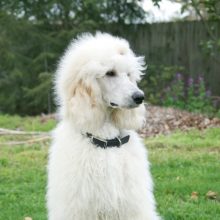Poodle (Standard)
Lifestyle Needs

The Poodle is typically an intelligent and amusing dog, lively and full of character. His coat does not shed, which is a definite advantage, but it does need grooming every day and should be clipped regularly. Ideally he should live in a house with a garden and should have regular exercise with opportunities to run free. His usually high level of intelligence needs mental stimulation such as obedience training.
Genetic Diversity
(Known as Coefficient of Inbreeding: 'COI'. It should be as low as possible.)
The UK Kennel Club breed average COI is 3.6% - See 'A Beginners Guide to COI'
Gene Pool Size
(Known as Effective Population Size: 'EPS')
n/a
EPS is a measure of how many individuals are contributing genetically to a breed population. It is a measure of the size of the gene pool in a breed. Lower than 100 is considered critical by conservationists and below 50 brings a breed close to extinction. For more information see the Kennel Club article.
Health and Welfare Problems due to Conformation
(Body shape and physical characteristics)
- The Poodle’s very hairy and curly coat will easily tangle and harbour dirt and debris, which left uncared for, will make him miserable.
- Gastric dilatation volvulus (GDV) Bloat/Torsion. Common in deep chested breeds.
BVA/KC Health Schemes: www.bva.co.uk/chs
- Hip dysplasia: breed 5 year mean score 11.6 (parents should be lower)
- Elbow dysplasia: score should be as low as possible
- Eye Disease: Hereditary cataract (HC) (annual testing); Progressive retinal atrophy (annual testing)
Estimated Breeding Values (EBVs) : No EBVs are currently available for this breed
www.thekennelclub.org.uk/about-ebvs
DNA Tests Available
DogWellNet and IPFD Harmonisation of Genetic Testing for Dogs (HGTD)
www.dogwellnet.com/breeds
- Progressive Retinal Atrophy (PRA rcd 4)
Availability of a DNA test does not mean that it is always necessary or even desirable for breeders to use this test.
Other Breed-Specific Health Screening Schemes
- Sebaceous adenitis – breed club test.
Ask the breeder to show you the certificates for the above tests/screening for both parents. If any of the above tests have not been considered necessary by the breeder (and there may be good reasons), ask her to explain why.
Other Diseases Reported
(For which there are currently no genetic or screening tests for sire or dam)
- Epilepsy
- Hypoadrenocorticism (Addisons disease)
- Cancer
- Cushings disease
Ask the breeder about the medical history of the parents, grandparents and great grandparents. Consider carefully whether to purchase a puppy if some of these or other diseases are in the family line.
Ask about the breeder’s policy in cases of serious genetic diseases occurring to your puppy in later life. Good breeders will request to be informed of such events in order to improve future breeding decisions.
You are strongly advised to buy from a breeder who uses (or is prepared to use) the AWF Puppy Contract and Puppy Information Pack (PIP): www.puppycontract.org.uk
The breeder should also be familiar with the CFSG/DBRG Code of Practice for Dog Breeding